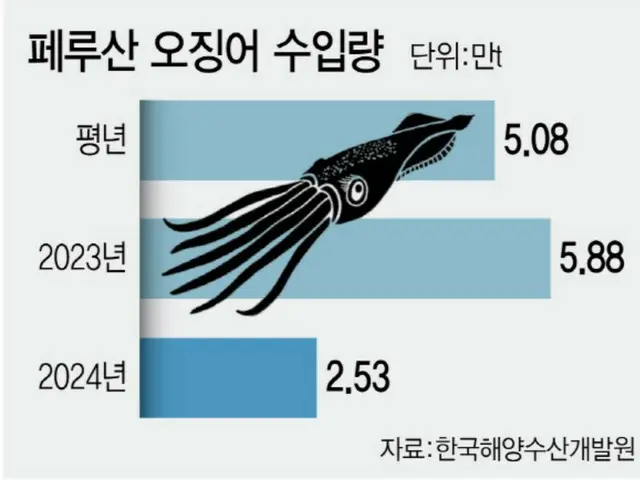The abnormal weather continues around the world, causing problems not only for domestic food ingredients but also for the production of various imported agricultural and marine products that are used as raw materials for processed foods.
The cost burden on processed food manufacturers has increased, and food prices continue to rise. Various raw materials, including squid, cacao, and coffee beans, have been affected by the abnormal weather, and it is expected that they will continue to be affected in the future.
Concerns are growing that food prices will continue to rise. In response, the South Korean government plans to continue with measures to stabilize prices, such as tariff quotas and discount support for various imported food ingredients.
According to the "Consumer Price Trends in March 2025" released by the Statistics Korea on the 2nd, processed food prices in March this year rose 3.6% compared to the same month last year, and the increase in the consumer price index (2.1%)
This is the first significant increase in 15 months since December 2023 (4.2%). The inflation rate of processed foods, which was in the 1% range until the beginning of last year, has risen by 1% since December last year.
Following on from April (2.7%) and February (2.9%), the rate of increase has been gradually expanding to the 3% range since the beginning of March. Looking at the main processed foods, the price increase of kimchi (15.3%) was followed by the price increase of Chinese cabbage and radish.
The price of Japanese flying squid rose sharply in March, while chocolate (15.5%), green coffee beans (8.3%), bread (6.3%), ham and bacon (6%) also rose.
The price of processed foods alone rose 40.3%, the highest increase among the 73 processed foods surveyed, and was also the largest increase since August 2011 (43.3%).
The rise in prices of processed foods is due to the rise in prices of raw materials caused by poor harvests. In recent years, climate change has led to the price hike of domestically produced Chinese cabbage, radishes, cacao, coffee beans, and other produce.
In addition to price hikes, high exchange rates and labor costs during the processing process are also factors that are pushing up the final price.
In particular, shredded squid, a popular dish in South Korea, has been affected by recent climate change.
Squid is mainly harvested in South America, such as Chile and Peru, but the El Niño phenomenon has caused a decline in Peruvian squid catches, which account for about 40% of total imports, and local prices have more than doubled.
Just as domestic coastal squid stocks are declining due to climate change, imported squid is also being affected by climate change.
The problem is that processed food prices are likely to continue to rise in the future.
Since the beginning of the month, prices of Ottogi Ramen, OB beer, and Maeil Dairy coffee drinks have been increased. If the shipping price increases, the consumer price will be affected depending on the inventory situation.
"Some processed food prices will be raised in April, so this is expected to be reflected in prices over the next few months," said Lee Do-won, director of economic trends statistics at Statistics Korea.
As consumers experience a sharp rise in food prices, especially processed foods, the government emphasized that it will take action.
At a meeting of economic-related ministers held on the same day, the Minister of Strategy and Finance said, "We will strengthen monitoring of price hikes caused by capacity reductions and strictly crack down on price hikes caused by collusion on food and restaurant prices."
The South Korean government will implement discount support for agricultural, livestock and fishery products, mainly at large supermarkets, while also considering introducing new quota tariffs on processed pork and egg products, which are the raw materials for ham, sausages and other products.
The government also decided to continue the existing exemption from value-added tax on imported raw coffee beans and cocoa, as well as financial support for the purchase of food ingredients.
A Ministry of Strategy and Finance official said, "Recently, the pace of price increases for petroleum products has slowed, and the rate of increase in prices for some fruits and other agricultural, livestock and fishery products has also stabilized.
"Although the underlying prices (1.9%) excluding petroleum and agricultural, livestock and fishery products are showing a stable trend, we are taking steps to lower perceived prices," he said.
We will continue our policy efforts."
2025/04/03 07:04 KST
Copyrights(C) Edaily wowkorea.jp 107

